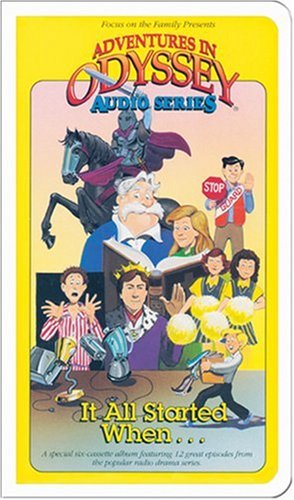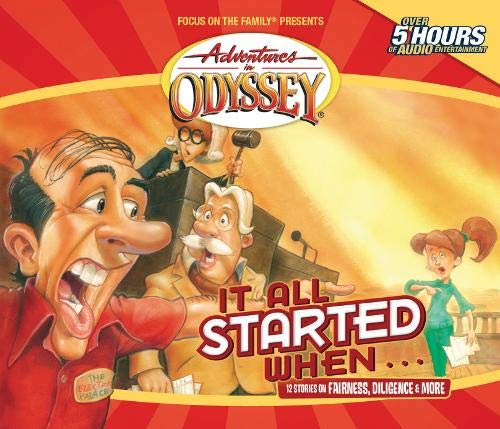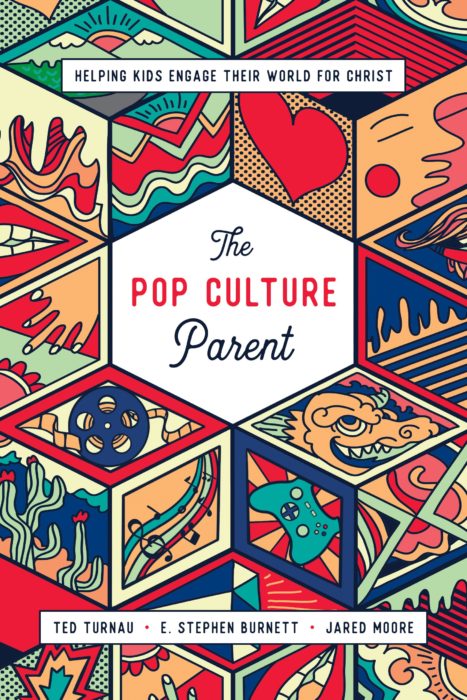Two ‘Adventures in Odyssey’ Stories Secretly Inspired My Book ‘The Pop Culture Parent’
It all started when Santa returned for Christmas 1992, and gave me a copy of the twelfth (at the time) cassette album of Adventures in Odyssey episodes. Focus on the Family had just polished up its audio drama series with a new theme version, and likely some other production changes.1
I’d grown to love the series. These twelve standalone episodes, each themed after a specific biblical virtue, were no exception.
The album’s first episode was called simply “You Gotta Be Wise.” I’ll describe its importance in just a moment. Because it was just this past week I realized, to my shock, that without this story—and the one on the cassette’s other side—I might not have written my first book.
Of course, I’ve already written how this fantastical Christian-made audio drama has influenced my views of faith and fantasy. Back then, I wasn’t thinking of specific episodes. Mainly I recalled the overall series’s delightful blend of imagination and truth, thanks to flawed yet true heroes who’ve adventured in the fictional town of Odyssey for more than thirty years. But more recently, I was preparing two podcast episodes about my new book The Pop Culture Parent. And I happened to mention this specific Odyssey influence.

Here’s the original “It All Started When…” cassette album, first released in 1992! (At first this was album 12, which made little sense because the next album, “At Home and Abroad,” included stories that aired before the stories in this album. Later the Odyssey team reordered the albums.)
Episode 179: ‘You Gotta Be Wise’
“You Gotta Be Wise,” written by Paul McCusker, likely isn’t remembered by fans as a groundbreaking story. It wasn’t like the one where Mr. Whittaker tested an afterlife program on the Imagination Station. Or the eleven-episode arc in which Dr. Blackgaard tried to take Whit’s End.
Instead, in this simple tale, newspaper editor and dad Dale Jacobs learns that his daughter, Robyn, has a new music fandom.
Robyn has just bought a new cassette of her own, “As Crusty As They Wanna Be.” This new album was just released by Odyssey gang-turned-rock-band The Bones of Wrath. Dale finds her listened to this antique(?) media in her bedroom. We hear its distant, squalling racket.
“It’s good stuff,” she says simply, and hands her dad the headphones.
“Yow!” Dale yelps, and yanks them off. “It sounds like a cross between a jackhammer and—several cats being scorched with a flamethrower.”
I can quote those lines from memory. This is despite the fact that, as I recall, the original cassette suffered damage. As all you internet meme–affirmed Nineties Kids can attest, back then you had to ensure the tape ribbon itself didn’t break, or else leak out from the cassette casing (forcing you to roll it back in with ink pen that had the exact dimension of pen cap). Said damage may have added to a low-level Burnett mystique about “You Gotta Be Wise.” But it also dealt directly with this mysterious thing called “rock and roll music.”
By the story’s end, Robyn Jacobs of course must learn to practice wiser media discernment. But … even listeners aged eight through twelve also join Dale as he deals with this popular cultural work, and more importantly, how it affects his relationship with his daughter.
Not just rock-and-roll rules, but relationship
Dale even confronts a group of outraged parents who in their zealotry arrange a bonfire. “You want to burn the tapes?” he exclaims. It’s no joke. Back then, real churches and some fringe ministries actually held such combustion-oriented events. Possibly they thought they were following the biblical example of the Ephesians in Acts 19:19. “You Gotta Be Wise” is kind to these reactionary parents, yet holds them up for examination. The story also portrays Rodney Rathbone (and his scheming dad-manager, Bart) for gentle ridicule.
Dale isn’t on the tape-burners’ side. Instead, he wants to navigate free-speech issues while teaching his daughter. But first he learns that she’s chased Rodney’s autograph and has bought their flames-and-skeleton poster. Dale raises his voice, makes demands, and tells her to go to her room.
“You Gotta Be Wise” isn’t about rock music or even just media discernment. It’s about this simple parent/child relationship.
Near the end, Dale and Robyn finally unite in Dale’s office. (He’s entered her world; now she enters his.) They reconcile.
Because he’s older, Dale goes first: “I’m sorry for overreacting about the tape and the poster. I was wrong.”
“And I was wrong for buying the tape and the poster in the first place,” Robyn replied. “I wasn’t being very—wise.”
“But you were right about something,” Dale continues. “I should have listened to this tape before offering an opinion about it. I should have listened to it with you, so we could talk about it together and decide whether it’s good or not.”
This careful, simple story surely helped build my own curiosity about parenting and popular culture, and in such a biblical way.

“It All Started When…”, Adventures in Odyssey album 13, revised version.
Episode 180: ‘Isaac the Pure’
Yesterday I re-listened to that episode. In fact, I listened to the full album. That’s how I found my second surprise: the cassette’s other side had another Odyssey episode that also sparked early biblical development on discernment issues.
In “Isaac the Pure,” another McCusker story, nice-kid Isaac Morton is disturbed by dirty jokes. (We only hear about these.) When he mentions this at Whit’s End, Mr. Whittaker starts to tell Isaac about biblical purity, then is distracted. This leaves Isaac to his own mechanistic devices. He’s already the first kid to give all the correct answers in Sunday school, and is prone to overthinking moral principles. So Isaac determines the quickest way to build his own purity culture is: get rid of impure things. He starts with his family’s magazines, and prompts his exasperated dad to wonder why his moralistic son is throwing away his entire collection of National Geographic copies.
Isaac sincerely asks, “Have you seen those pictures from Africa, Dad?”
From there, Isaac is left to purge his own room: toys, books, magazines, and Disney Read-Along Records (up to and including a version of Bambi). “Who knows how this stuff might influence me in weak moments?” Isaac wonders aloud to his friend Sam.
Of course, before long Isaac pursues things to their logical end and determines: (1) Isaac is not made impure just by impure things, but by impure people; (2) so he must also avoid Sam; (3) Isaac is made impure by an impure world; (4) so he must stay in his room all day, with the lone exception of school and only then because his parents make him go.
Of course, Isaac must learn a very specific teaching—and object lesson by way of a restored clock—thanks to Mr. Whittaker.

Now available from New Growth Press. Perfect for your family, Sunday school, or parenting class.
And I learned an important lesson, too. Purity doesn’t start on the outside, because we follow rules, purge “impure” items, or refuse to associate with particular friends or places. Only a Pharisee (or a well-meaning, Pharisaical child) would think that way. Instead, Jesus said purity is a matter of the heart. As Mr. Whittaker says, Jesus changes us from the inside-out, and not the outside-in.
Thanks, Odyssey team, for inspiring The Pop Culture Parent
I’m not the only author of The Pop Culture Parent. Instead, I’m blessed to share credit with my friends Ted Turnau and Jared Moore. Of course, it’s actually multiple teachers who contribute to any book. and in this instance, I can happily credit writer Paul McCusker, Phil Lollar (writer/director and voice of Dale Jacobs), and the entire Adventures in Odyssey production team as my long-distance teachers. God bless ’em. They helped start me on this quest to understand popular culture and parenting.
To be sure, my own parents, plus hosts of pastors and biblical phrases also helped. But sometimes it takes more than a nonfiction sermon, textbook, or even Bible verse to help us learn virtues. Sometimes it takes simple, non-epic stories, about a parent and child wrestling with a rock album, or about an overzealous boy with his own purity culture, to make these gospel truths come alive in our imaginations.

Photo credit: E. Stephen Burnett. This building is basically Whit’s End, and it’s located in Georgetown, Texas, and thou shalt not miss with my headcanon.
- By then the animated videos had begun releasing and the Odyssey team was adjusting to the extra attention. ↩





























We own the first 50 or so sets of Adventures in Odyssey that my kids listened to obsessively up until around 10 or so, and then they randomly decided they didn’t want to. It’s really interesting the various different storylines they covered. Sometimes I thought it was a very thoughtful examination, and other times…. It was obviously something one of the Focus on the Family people was on a rant about. Those were usually the less well handled episodes.
If you can, picking up the 12 never again aired episodes is an interesting one to listen to. It’s ones they wrote, aired, and then realized Adventures in Odyssey is maybe not the right media to explore this in. The main episode I remember on there explores the idea of Connie’s friend planning to get an abortion.